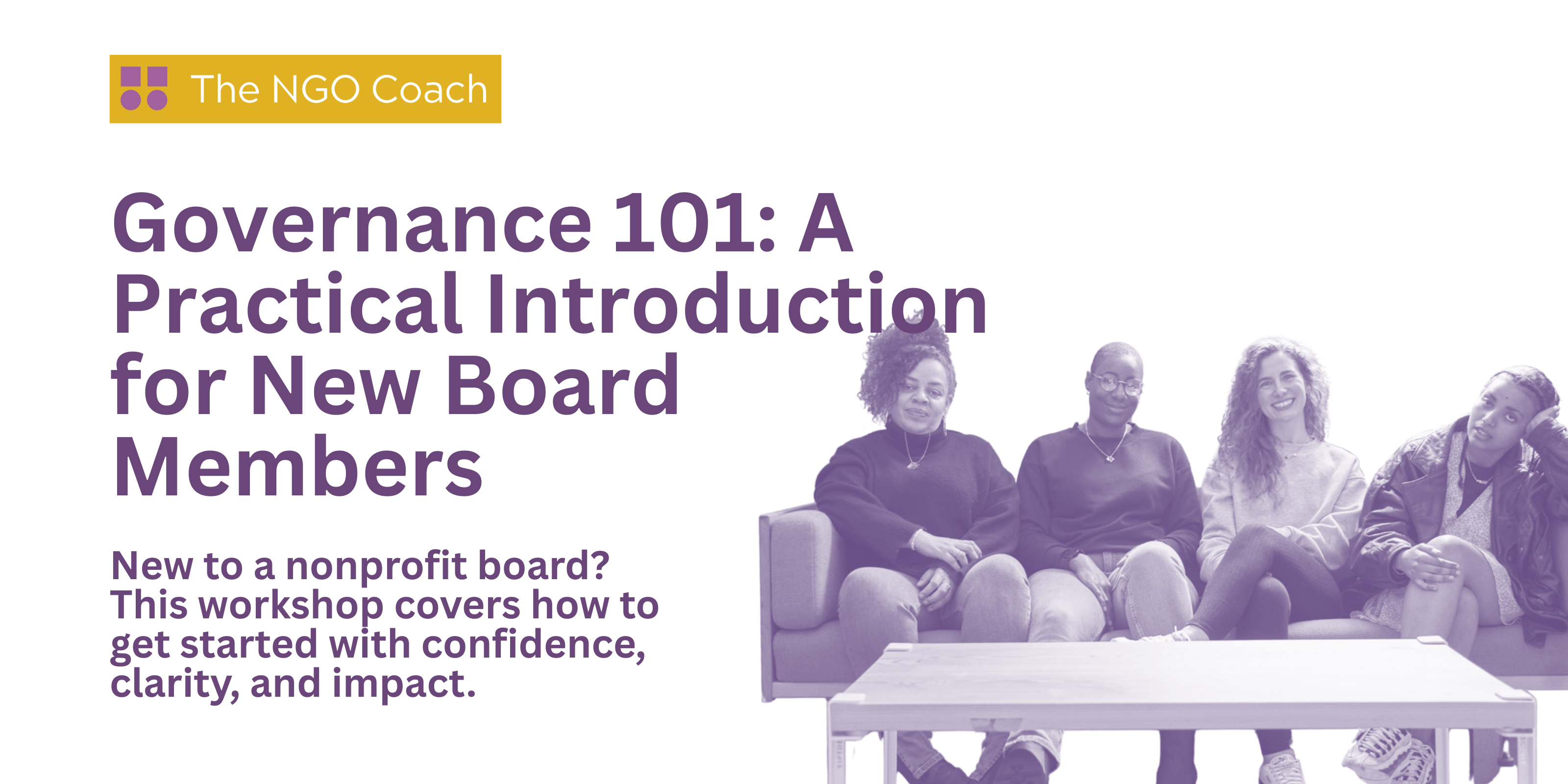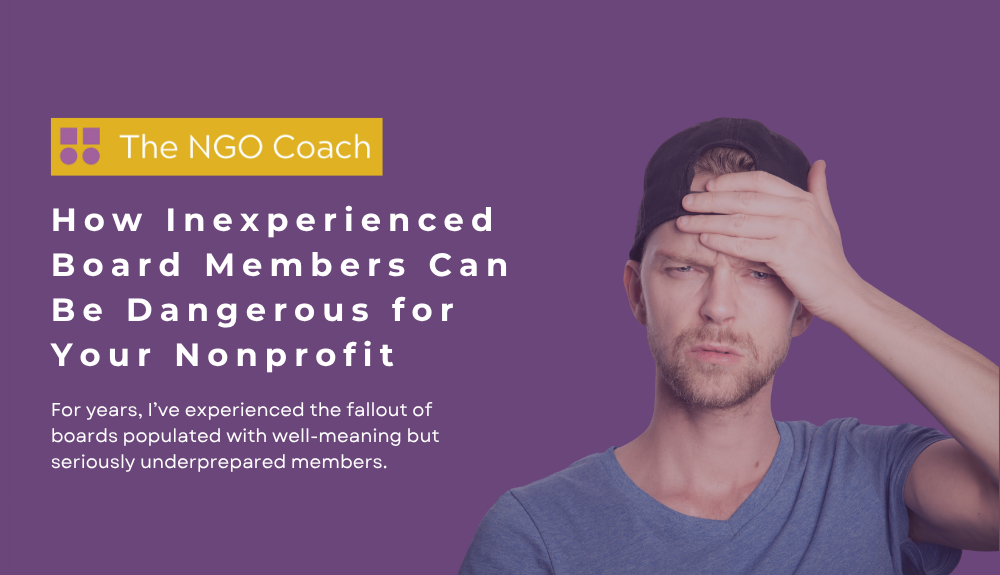As The NGO Coach, I spend a lot of time sharing stories, strategies, and practical tools to help nonprofits thrive. My focus is usually on optimism, collaboration, and positive change. But today, I need to talk about a topic we often tiptoe around — and I won’t sugar-coat it:
Inexperienced board members can be not just ineffective, but downright dangerous for your organisation.
Yes, I said dangerous.
For years, I’ve supported, witnessed, and personally experienced the fallout of boards filled with well-meaning people who simply haven’t taken responsibility to prepare themselves. Let’s be honest: this is about individuals who choose to sit back rather than step up — and that unwillingness to build governance competence is harming organisations across our sector.
The reality? Nonprofits are struggling under the weight of a massive knowledge gap at the governance level. Boards without the right skills or understanding leave organisations vulnerable — legally, financially, and culturally. And it’s taking a toll on everyone: kaimahi / staff, tūao / volunteers, clients, funders, and the very communities nonprofits exist to serve.
The Catch-22: How Boards End Up Ill-Equipped
There are never enough skilled volunteers lining up for board positions. People get ‘volun-told’ or convinced into taking a seat at the table — then suddenly they’re holding legal and moral responsibilities they don’t fully grasp. Meanwhile, the organisation carries all the risk.
Many board members step straight from voluntary or operational roles into governance with no understanding of what effective oversight actually requires. They’re accustomed to rolling up their sleeves on the ground, but governance is not an extension of volunteering — it’s a fundamentally different, critically important responsibility. This failure to grasp the difference between operational tasks and strategic oversight doesn’t just cause confusion; it breeds dysfunction, undermines leadership, and leaves the entire organisation exposed to serious risk.
Here are just a few real examples I’ve encountered or heard from peers:
- A first-time Chair trying to take over day-to-day operations from the CEO, with no grasp of the funding landscape, existing partnerships, legal obligations, or even the line between governance and management.
- Two board members nearly coming to blows during a meeting after months of power plays.
- A Chair undermining their CEO by making false promises directly to staff behind the CEO’s back.
- A fundraising sub-committee demanding the CEO teach them how to fundraise.
- Boards ignoring financial oversight entirely — only discovering fraud once it’s too late.
- Chairs unaware of annual reports being filed with Charities Services that the board never reviewed — reports that exposed serious issues, including fraud.
- Recruiting a board member with ties to an organisation investigated by the Serious Fraud Office — a fact only discovered when the CEO did their own due diligence.
The Three Dangerous Paths of Inexperience
When a board member doesn’t know what they’re doing, they tend to:
- Replicate existing practices — good if the board is healthy, but more often bad or entirely absent.
- Copy what they saw on other boards — which can repeat dysfunctional patterns from elsewhere.
- Withdraw — staying silent, disengaged, and failing to contribute meaningfully.
The result?
- A board consumed by petty power plays and internal politics, completely losing sight of the mission they’re meant to champion.
- Negligent or outright absent oversight of finances, risks, and legal obligations — leaving the organisation exposed to fraud, non-compliance, or collapse.
- Consistent failure by the board to provide the Chief Executive with the professional support they need to succeed — leaving them isolated, overwhelmed, and forced to navigate critical challenges alone, which weakens the entire organisation.
- Boards so inward-looking and self-involved that they ignore building crucial relationships with funders, partners, and community stakeholders — isolating the organisation when it needs allies most.
No More Excuses: Step Up or Step Aside
Yes, you’re a volunteer. Yes, you give your time. But let’s be blunt: it is completely unacceptable to shrug and say, “I don’t know what I’m doing” (or simply try to hide that fact). That ignorance doesn’t just slow things down — it actively endangers the organisation you claim to care about.
If you’re not willing to learn and lift your performance, you should reconsider whether you belong on the board at all.
Here’s what you must do — starting now:
✅ Take full personal responsibility for closing your knowledge gaps. There is no excuse — free, reputable training for board members is widely available online. Use it.
✅ Master the fundamentals: the difference between governance and management, your legal obligations, financial oversight, and effective board processes.
✅ Have courageous conversations with your fellow board members about where you’re falling short. Don’t hide behind a lack of budget for formal training — build capability together.
✅ Challenge and support each other relentlessly to raise standards, hold each other accountable, and stay laser-focused on protecting the mission and integrity of your organisation.
The Bottom Line
Inexperienced, unchecked boards are a risk your nonprofit can’t afford. Knowledge gaps in governance don’t just hold back progress — they actively endanger your organisation, your people, and your impact.
You owe it to your cause, your staff, your community, and yourself to do better.
Step up, skill up, and be the board your nonprofit truly deserves.
Start Learning Today


